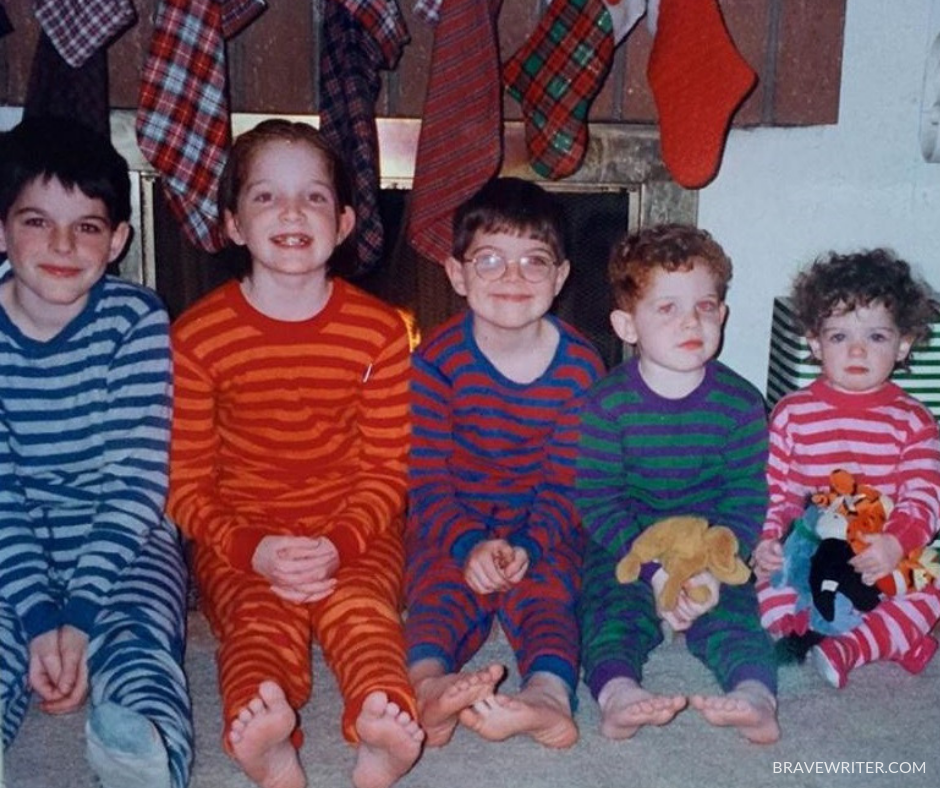If You’ve got a Passel of Kids
 Bogart Kids, 1999
Bogart Kids, 1999
What I did when I homeschooled my five: I kept us all together as much as possible! Here’s how.
We started our days together every day. We spent one hour of the morning reading.
- Devotional literature
- Non Fiction (like books about nature or tanks or world religions or geography or the weather or how to make films…)
- Aesop’s Fables or Greek myths (we did one of these each day for years)
- Read Aloud (whatever novel we were reading as a group)
- History book (we used a variety of narrative history texts over the years, not history textbooks)
- Poetry (not every day, but many days—this is when we’d memorize poems together)
The kids usually knitted, or played with Legos or blocks while I read.
When we finished what we called Read Aloud Time, we would move to the table for math pages and copywork. These were usually according to level, but we did them all at once so that I could be in “math mind” or “writing mind” and not go back and forth.
Sometimes copywork came first, and usually passages were pulled from the same book, but different lengths per kid. Sometimes they picked their own copywork passages. New-to-writing kids used handwriting books.
Then we’d work on our history all together—same topic, same era. This might include preparing little oral reports or acting out a scene of history. It might include captioning an illustration of the reading of the morning or making maps or artifacts from that era. Sometimes we prepared a party to go with the era of history.
If we were working on a writing project, we all worked on the same topics or same concept for writing (posters – everyone, mini books – everyone, freewriting – everyone). Each child would write naturally at his or her level. It’s not like I had to drum up a brand new idea for each child each week. So exhausting! When we wrote descriptive paragraphs, we were all observing and note-taking and talking about our items at once, with me superintending. I didn’t create a project for each child, unique to that child.
Poetry Teatimes were always done as a group, poetry books of all levels available. I brought my adult poetry books to the table so I could share poems I found meaningful, even if above their level. I felt that was the best way to introduce them to some of the more challenging poets.
Then we might take a hike or kick a soccer ball in the yard or watch a movie or go to the store or to an art museum or the library…
The rhythm of our days was not determined by grade level. Rather, it was shaped by topics—each child would naturally perform at his or her level. That’s where “grade level” revealed itself. But I didn’t cater to it or pay it much notice, honestly.
It’s a shift in thinking. You are a one-room school house. You want to make the most of that environment. Create learning opportunities that call all of you together. Your older kids will inspire your younger ones, your younger ones will cheer up your older ones (and make them feel smart). They can work together, helping each other out, and making suggestions. They provide great audiences for one another too!


















Thank you. I know each family is unique and there is no one right way, but it is always fun to hear how other families spend their days together. We happen to have a similar picture of our days and find the time slips away so quickly. We also have about an hour each day when we have quiet time in the afternoon to pursue our own individual pursuits. One day I plan on joining my 3 year old for a nap. Wouldn’t that be lovely?
I have a question : when did you teach your children to read ? I’m sure having five, yoi had one of them learning to read for quite a while. I must say that right now I feel like I’m teaching four kids to read. The oldest defnitely reads but is dyslexic and still needs many corrections, my second (almost 9) is struggling to learn to read, we’ve been working at it for the past 4 years. My 3rd (7) reads but needs to build up her fluency and my 4th (5) is learning to decode. So while I would love a schedule that allows us to all do the same thing at the same time (but different levels), I feel like they all need one on one time with me and it is very time consuming… Any advice ?
SO thankful for this post….I have four children ranging in ages 10 to 3. I have been a bit fearful about adding the third in next year as an official “homeschooler”…but after readig this I have a nee plan to make it work! Thank you!
Thanks for this, Julie. I’m currently homeschooling one of my three but I plan to have all three at home within the next year-plus. I try to conceptualize what that will look like, and this post is super-helpful.
Is there a reply somewhere to Rebecca about the reading? I am in a similar situation. How do we fit the one-on-one time needed for subjects like reading instruction? I have twins bothlearning to read and a struggling 8yo.
Hi Emma!
Teaching reading is a one-on-one activity. I agree. I know with my kids, I tried to do it in the afternoons during nap times for youngers, after lunch and more of our school work together was finished.
Perhaps that would work for you?
Julie